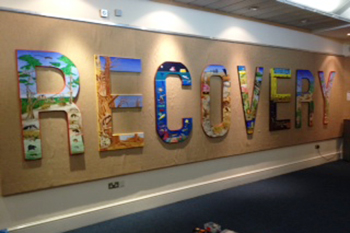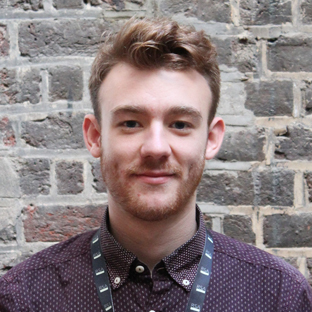Situated in the grounds of Norwich cathedral beside St Ethelbert’s Gate, it’s difficult to imagine a more serene environment to locate one of Wellbeing Norfolk and Waveney’s hubs. I went to find out how the small revolution in community-based primary mental health care - that has brought together Norfolk and Suffolk NHS Foundation Trust alongside three local Mind charities and Relate - has challenged clinical orthodoxy in its mission to support patients.

The 2007 Adult Psychiatry Morbidity survey*tell us that 17.6% of the UK adult population (21.0% of women and 11.9% of men) have a common mental health diagnosis. Up until relatively recently, mental health services have largely focused on providing support for these people through secondary care services in hospitals or through IAPT services (Improving Access To Psychological Therapies).
A recent RSA report highlighted the huge disparity in effectiveness of IAPT services, with some services having as high as 90% drop out rates. Not only does this prove expensive and can reduce recovery capability of people who use these services but in the case of IAPT it can doesn't produce the required outcomes either. IAPT services have a 65% drop out rate with access to IAPT as a percentage of those estimated to have anxiety and depression being only 13.6%. In Norfolk, these interventions have proved useful in bumping this figure up, having a 45% completion rate.
What is the service?

In the five years since Norfolk and Waveney Wellbeing Service took over NHS IAPT (Improving Access To Psychological Therapies) services in the area and joined up primary and secondary mental health services, it has created a unique partnership that is attempting to transform the traditional clinician-patient relationship. I met with the clinical and social leads from Mind, Relate and Norfolk and Suffolk Foundation Trust to discuss how they work together and what other services around the UK can learn from this emerging model. Their enthusiasm for the service and its potential was contagious.
Offering a service that encompasses mental health clusters 1-4 (1 being mild common mental health difficulties, 4 being more severe forms of depression and/or anxiety), the service goes above and beyond typical primary care IAPT delivery and and improve its outcomes by taking a more social approach. Indeed, activities are purposefully not confined to clinical interventions. Regularly seeing over 150 people per week they range from workshops and art therapy in local cafés, gardening clubs to walking groups.
Beyond the networks of its staff, the service depends on nurturing social connections between patients, their families are wider communities. They use community resources, shops, cafes (similar to the Open Works model of change spearheaded by RSA Fellow, Tessy Britton) and cite Jim White’s ‘community psychology’ theory in “challenging the sacred cows” of traditional psychotherapy practice by connecting people and developing learning communities that act as recovery communities.
What makes it work?
“We want to be a constantly evolving service.” – Liz Farrow
The service operates through two boards, the partnership board representing external stakeholders, including Public Health and the CCGs, and an operational board where the five service providers make day-to-day decisions. Made up of cognitive behavioural therapists, psychotherapists, relationship counsellors, and a tiered system of voluntary roles and peer-to-peer support workers, the service boasts around 200 staff and a rapidly expanding programme.
Starting with a 30 minute appointment with a wellbeing adviser, each client is asked what they think the service can offer them and is supported to guide themselves to appropriate help. This is crucial to the model as the service understands that treating individuals as a whole person, rather than a set of diagnoses, is an important way supporting recovery and building resilience. The service encourages the use of peer-to-peer support workers, who enable people to make meaningful social and community connections.
Liz tells me the work of Relate has built up steadily over the years until it became fully integrated into the partnership:
“When we started, Relate had little to do with IAPT, but when we began to find that we have could achieve 65% recovery rates for IAPT services, we knew it was working. Our work is helping the whole family and by extension the local community”.
Nesta Reeve, the clinical lead for the wellbeing service, challenges the notion of the sometimes one-size-fits-all approach of IAPT:
“IAPT can be too clinical. Clinicians tend to think they can ‘treat’ people and that they have the answers. That’s why our peer-to-peer support workers are central to our services, they remind our staff and shift the culture towards self-directed help, not prescription- we don’t like the word prescription”.
They argue that having peer workers is central to the service as it helps to ameliorate problems with clients becoming dependant through the fact that they themselves are in recovery. As one of them told me:
“It’s not about what the person can get out of the service but how the service can help them understand what they need to do to help themselves - it is all about giving away power. If they want to go off and have a walking group, we let them do that. It’s challenging to the dominant way of thinking”.
 The RSA has been pioneering this way of working, with our four-year Whole Person Recovery project, in partnership with national treatment provider CRI, in West Kent delivering a successful model of peer-led recovery. In West Kent peer-mentors are being used more than ever, particularly with those with dual-diagnosis and backed up with credible evidence, as we provide in the RSA’s recently published Whole Community Recovery report.
The RSA has been pioneering this way of working, with our four-year Whole Person Recovery project, in partnership with national treatment provider CRI, in West Kent delivering a successful model of peer-led recovery. In West Kent peer-mentors are being used more than ever, particularly with those with dual-diagnosis and backed up with credible evidence, as we provide in the RSA’s recently published Whole Community Recovery report.
Norfolk and Waveney is a trailblazer in the delivery of mental health services and clearly highlights the failures in IAPT services that are too clinically based and also don’t access allow access to enough people.
Alongside developments beginning with NHS England’s ‘Health as a social movement’ programme, of which the RSA is a National Learning Partner, this service should be championed. These kinds of services as well as helping people becoming better able to choose their own care in a way that suits them and this really isn’t about saving the NHS money and is I hope the first of many in mental health care. We need to encourage the building of vibrant, diverse and strong support communities and NHS commissioners should harness this potential by funding these new interventions. The time is right to embed these new approaches to mental health care to truly see what ‘parity of esteem’ really means.
Follow the debate on twitter at #RSAwellbeing
*The new national Health and Wellbeing Survey will be published at the end of 2016
Related articles
-
Blog: Mental health outcomes in England – a map of quiet discrimination
Charlotte Alldritt
Charlotte Alldritt discusses the findings of the latest Open Public Services Network project which opens up data on mental health services provision.


Be the first to write a comment
Comments
Please login to post a comment or reply
Don't have an account? Click here to register.